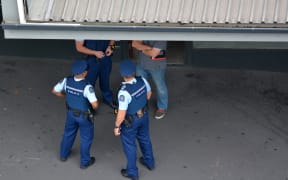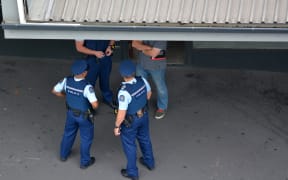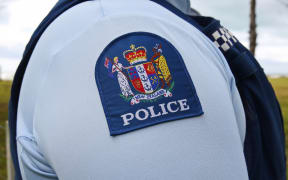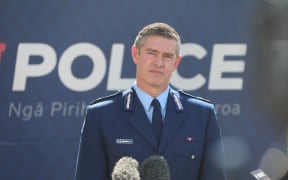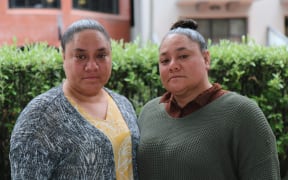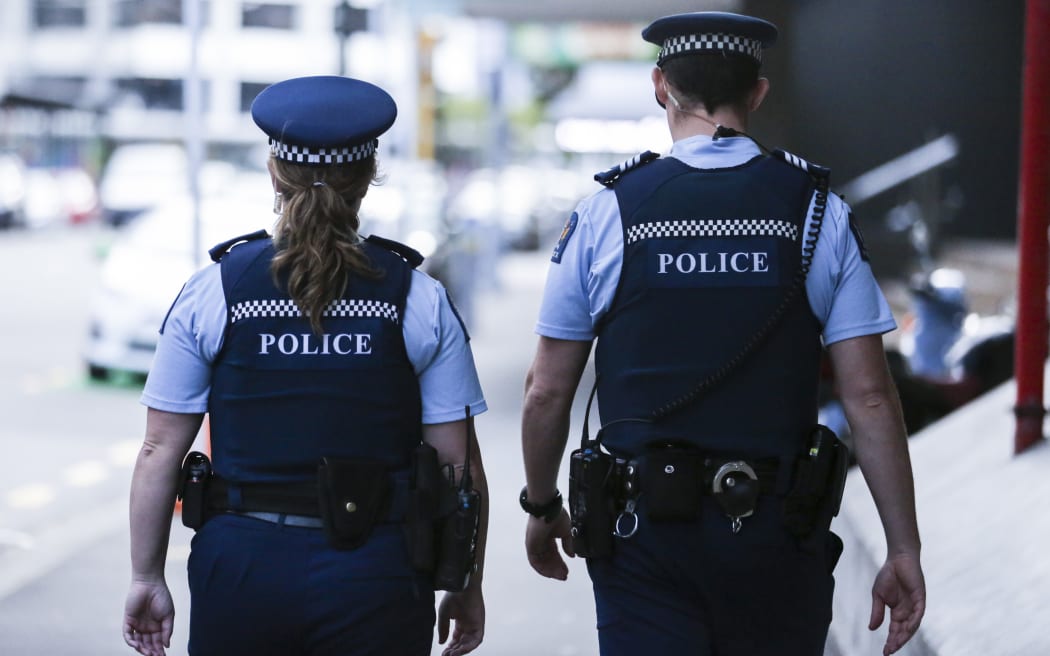
Photo:
An internal police report shows officers were routinely photographing young people on the street despite no policy allowing them to do so, and their own lawyers questioned whether the practice was "helpful policing".
The report was done at about the same time, and fed into, a joint investigation begun in late 2020 by the police and privacy watchdogs.
Their investigation was released in September last year and found systemic problems with the way officers take, store and use people's private biometric information.
The internal police report, from May 2021, also contained police legal advice that the practice of stopping and photographing young people likely breached UN protections for children.
And it said officers were taking pictures of young people at shopping malls, businesses, libraries, and downloading pictures from social media.
How did we get here?
The report was triggered by RNZ stories, and led to damning findings from the joint Privacy Commission and IPCA investigation in September 2022.
It found police were routinely and illegally photographing and filming young people and adults with little cause, collecting tens of thousands of photos with few systems and controls.
Police say they have now stopped indiscriminate photography of young people in public.
Police did not accept all of the findings of the inquiry, saying some would hamper the police's ability to effectively investigate and prevent crime.
They have now asked Crown Law to weigh in on whether the watchdogs are interpreting the law correctly.
What does the internal police report show?
The internal report obtained by RNZ reviews police photography policy - and it is clear.
"The policy currently does not provide for taking photographs of children or young persons without consent, for example, for the purpose of an active investigation, intelligence purposes or prevention," it states.
The rules only allow taking pictures and fingerprinting of children and young people if they have been detained for committing an offence; are suspected of committing an offence and police intend to prosecute; or with "informed consent" - including from a parent or guardian.
The report by the policy youth services team said police policy gave officers no clarity - it "is silent" - on when they can photograph children and young people without consent.
Nonetheless, it said the policy: "Does not provide for taking photographs of children or young persons in a public place."
And it said there was "no specific policy covering photography of adults (with or without consent)".
Police told RNZ in a statement the public can be confident they were balancing the need to do their work with the public's right to privacy.
They said they were making a number of changes to policy, training and procedure.
Police lawyers question merits of photographing children
Legal advice in the report questioned if photographing young people was "helpful to policing generally".
It suggested the practice of stopping and photographing unaccompanied minors was arguably arbitrary detention, or a deprivation of liberty.
"If it is against police policy to photograph children in certain circumstances, yet this is occurring, this action could amount to a breach of [UN Conventions on the Rights of the Child]," the legal advice stated.
Officers download pics from social media
The report said most districts were taking what it called "non-voluntary photographs" - pictures of children and young people in public places without consent.
These included at "high volume crime locations"; events; shopping malls; public facilities like libraries, homes, and roads; businesses, police stations, and jails.
Officers were also downloading pictures from social media.
Officers took "non-voluntary" pictures of young people during gang investigations and to help with high-volume dishonesty type offences, and to log the appearance of offenders as it changed over time.
Meanwhile, the report said all districts were photographing adults in public.
Not only in the places listed above, adults were also snapped at parties and visiting friends and family whose homes could be seen from the road, and at vehicle stops.
The report noted that generally, photographing practice varied between districts, and policy was not clear about the "lawful purpose" phones could be used for taking pics.
Photos were stored in a number of different systems, there was no policy on storage and deleting pics and fingerprints.
There was also limited training and guidance on privacy or collecting personal information.
Issues with getting consent for "voluntary" fingerprints, photos
The internal police report said its policy clearly required informed consent when getting what the police call "voluntary" fingerprints or photographs from young people who have been taken into the station.
But it said policies were not clear on the lawful basis for collecting the information, outside of the situation where a young person was being arrested or charged.
The watchdogs' joint inquiry found police had developed a "widespread" and "systemic" and sometimes unlawful practice of taking photos and fingerprints from youths in custody for suspected offending, but who had not been arrested.
The personal information would be kept longer than legally allowed.
The Privacy Commission has launched a separate action - a compliance notice - against police over it.
Law changes and court decisions tipping balance towards children's rights
Police legal advice in the internal report noted that changes to the Oranga Tamariki Act in 2019, and recent court decisions, have increased the weight given to the rights of children.
It said judges have been increasingly applying UN and Treaty considerations to cases, saying there are minimum standards - mandatory rights and protections afforded to every young person.
The advice cites a UN provision requiring the best interests of the child be of primary consideration.
"It must be considered whether photographing the child is for their best interests, or that if it is helpful to policing generally."
The legal advice says: "It could be argued that any police behaviour which is itself a criminal offence or in breach of police guidelines would vitiate a deprivation of liberty even where that deprivation would otherwise be free from arbitrariness.
"This means the burden for respecting the child's rights and protecting them from a rights violation rests on the officer dealing with the child.
"Where police stop a young person and ask if they can take their photograph in the street in circumstances where they are not accompanied by a parent/guardian and do not realise they are free to decline, then this could amount to an arbitrary detention and be in breach of [UN conventions for children].
"Ultimately, in an interaction between a youth and police, the youth depends on the conduct of the officer for the enjoyment of their rights."
However, the legal advice notes other factors police have to take into account, including public safety, victims' interests and accountability.
Problems getting and recording 'voluntary' consent
The internal police report noted there was no national or local audit on whether the threshold for informed consent has been met.
It also said the form used to record consent was "inadequate".
"The form is dense and in small font, there is no provision to record the [child or young person] comprehension of informed consent (only space for their signature to give consent)."
Police getting Crown law advice on some joint inquiry findings
Police have asked Crown Law to investigate the legal basis cited by the watchdog inquiry into the practice of collecting "voluntary" photographs and fingerprints from young people.
Police did not accept all of the findings of the inquiry, saying some would hamper the police's ability to do their work.
In the meantime it has paused the practice of collecting the "voluntary" fingerprints and photographs.
The police have begun a programme of reform since the joint inquiry released its findings, but still have a huge amount of work to do before their end-of-year deadline.
The latest update out this week covers the three months to September last year.
Overall, of 14 specific actions required from the "enforcement notice" action taken by the Privacy Commission, eight are at the earliest stage of progress, two are further ahead, and four are finished.
Work to improve officers' understanding of when they were allowed to photograph young people continues, and personal information of both young people and adults taken unlawfully is being identified and deleted.

